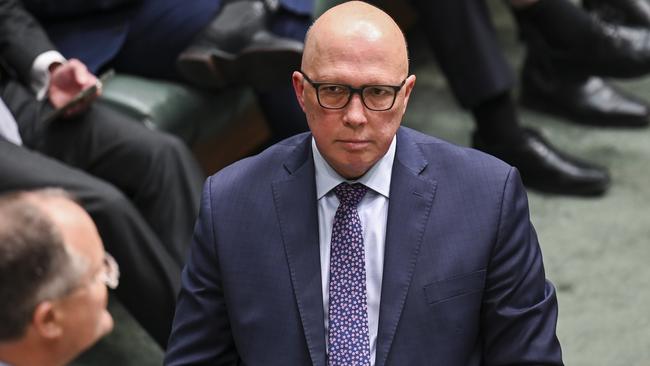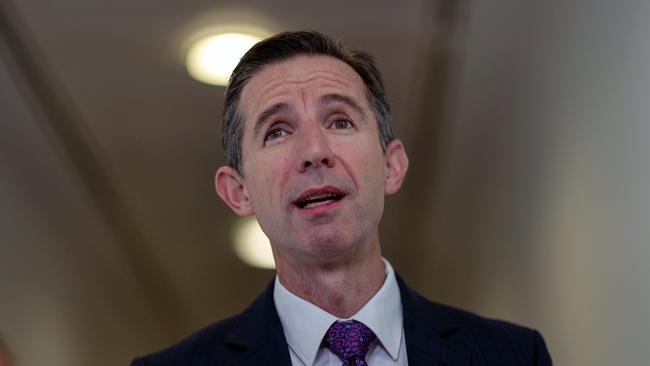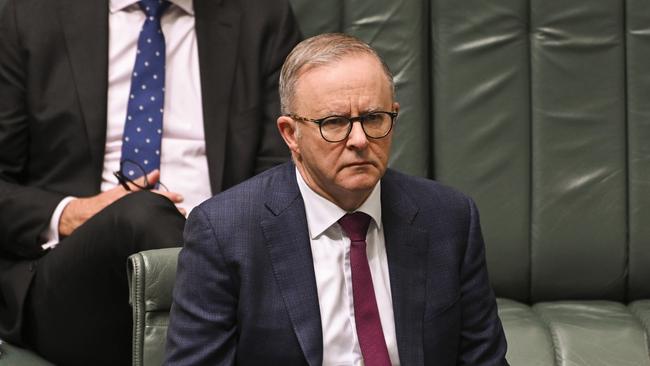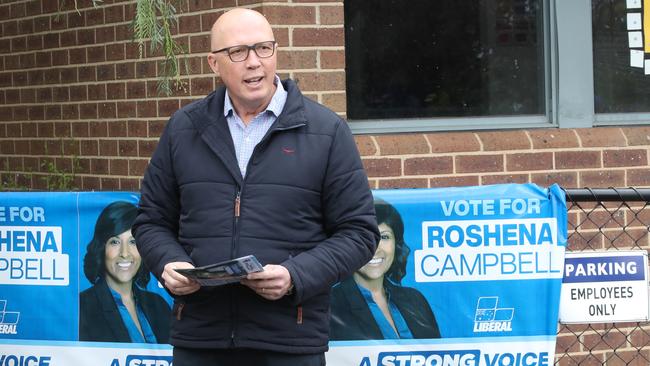Liberal Party rejects Anthony Albanese's Voice to Parliament model
The Liberal Party has made a call on Anthony Albanese’s Indigenous Voice referendum after a lengthy party room meeting in Canberra.
National
Don't miss out on the headlines from National. Followed categories will be added to My News.
The Liberal Party will campaign for the “no case” against the current model of the Voice to Parliament but allow backbenchers a conscience vote.
The position, which was reached following a lengthy party room meeting, will require frontbenchers who support the proposal to resign or fall into line and back the Coalition position.
The position is party policy but will not bind backbenchers such as Bridget Archer and Andrew Bragg from campaigning for the ‘Yes’ vote.
Opposition Leader Peter Dutton confirmed that he will actively campaign against the Voice proposal outlined by Anthony Albanese.
“I don’t think this is in our country’s best interest,” he said. “I have spent literally months, like many Australians, trying to understand what it is the prime minister is proposing.
“We cannot get the basic details out of them. We think it is deliberate. We are waiting, waiting for advice.”
He warned the proposal outlined would change “our system of government forever”.
“They have deliberately decided not to give advice,” he said. “The wording put forward in its form is inconsistent with the advice of the first law officer and Solicitor-General.
“That is an important point to make and we’re saying that Indigenous people shouldn’t be heard in relation to these matters. On the contrary, I am emphasising the voice needs to be heard.”
Deputy opposition leader Sussan Ley said it was not a ‘No’ to constitutional recognition.
“Today is not a no from the Liberal Party, it is a day of many ‘yeses’: yes to constitutional recognition for Indigenous Australians, yes to local and regional voices, yes to better outcomes for Indigenous Australians, yes to Australians having their say,” she said.
However, Mr Dutton blew up over a question about whether he should resign if voters defied his big call on the Voice and back the Yes case.
“People can draw their own conclusions around what people should do in the Canberra bubble,’’ he said.

“I assume you have proposed the same question to the Prime Minister. My motivation is to make sure we do what’s in the best of the country.
“We support an arrangement which recognises Indigenous people in the Constitution and means we can listen to local voices.
“There is an enormous amount of risk in what the Prime Minister is proposing.”
During the party room meeting today, former Prime Minister Scott Morrison told MPs that the current proposal was a risk and could not be supported.
He noted that Tony Abbott, who had always had a strong interest in addressing systemic issues in Aboriginal communities had raised concerns about the model being proposed.
Opposition Leader Peter Dutton told the Coalition that the decision wasn’t easy but the Liberal Party had to act in the national interest. He and other contributors conceded opposition had deepened after Mr Albanese’s new wording that required the Voice to consult the executive.
Tasmanian Liberal MP Bridget Archer gave a “forceful” contribution on why she disagreed with the position and backed a free vote for Liberal MPs, but there was little support.
NSW Liberal MP Andrew Bragg also called for a conscience vote in the meeting and others “hinted” including NSW Liberal MP and Victorian MP Russell Broadbent.
Opponents of the Voice argued that the current model contained “serious Constitutional risk.”
The news comes amid reports a majority of voters in the majority of states now support the charge according to an exclusive Newspoll published today.
Prior to the meeting, Ms Archer told news.com.au she was hopeful that she would be allowed to publicly campaign for the Yes vote.
“The best case scenario today is a position on the Voice that allows for a conscience vote,” she said.
“I am going to vote Yes, irrespective of what the party room decides. I know there are some people who don’t think it is a simple proposition. It’s about recognition for First Nation Australians and consultation about issues that affect their lives.
“There’s a whole range of views and I think we could land a conscience vote.”
Liberal frontbencher Simon Birmingham conceded there were “always risks” about the position the party lands on.
“Australians will be the ultimate arbiters and judges of this,” Senator Birmingham told Radio National.
“We should be very mindful of the way we engage in this debate.”

The National party has already determined they will advocate for a “No” vote.
Senior Liberals have confirmed that Mr Dutton has settled on a position that raises concerns over the legal risks of a voice body advising both parliament and the executive government.
While there is strong support for the Voice proposal in some sections of the Liberal Party, led by frontbencher Julian Leeser and Simon Birmingham, many of these MPs have become concerned by Anthony Albanese’s “my way or the highway” approach.
Labor frontbencher Katy Gallagher said it was the “right thing to do in history”.
“We do accept that bipartisan support is the optimal pathway,‘’ she told ABC radio on Wednesday morning.
“It seems to me the opposition has been searching for problems.”

Mr Albanese has repeatedly accused Mr Dutton of being the ‘Dr No’ of Australian politics and “undermining support for constitutional recognition of Aboriginal and Torres Strait Islander people”.
“I’m awaiting it,” Mr Albanese said. “I’ve had seven meetings with him. He’s met with the referendum working group. There are no signs,‘’ he said.
Labor MP Josh Burns has called Mr Dutton “the leader of the No campaign”.
“He says no, but Australia will say yes,” Mr Burns said. “This leader of the opposition does not have questions. All he has are tricky political tactics that are aimed at undermining reconciliation.”
Opposition spokesperson for Indigenous Affairs Julian Leeser has argued Mr Albanese should remove a clause that refers to advising the executive government.
But Attorney General Mark Dreyfus said the idea the Liberals would support the model if they agreed to some modest changes was false.
“I fear that most of the comments that have come from the Liberal Party since the election seem to have been more directed at finding reasons to oppose the Voice than supporting it,‘’ he said.
“This is a constitutionally sound proposal. The overwhelming consensus of constitutional lawyers around Australia, starting with former High Court Justice Robert French, is that this is constitutionally sound. It’s a proposal that’s been out there for a long time.”
The Liberal Party’s meeting today is first since the humiliating Aston by-election defeat that saw the previously safe Liberal seat fall to the Labor Party for the first time in 30 years.

Mr Dutton has urged his colleagues to “stick” together and understand where they are at in the electoral cycle.
“They understand that at the 10-month mark the government is still in its honeymoon period and they’ll continue that for some time,” Mr Dutton said.
Deputy leader Sussan Ley said it was “always a tough period going into opposition”
“But we are united, we are determined and we are ready to meet the challenges so we can demonstrate that we’re here for the Australian people who want us to provide an alternative,” Ms Ley said.
“Saturday was a tough day in the office but we’ll regroup, we’ll redouble our efforts and we will earn the faith, the trust and the support of the Australian people.”
Originally published as Liberal Party rejects Anthony Albanese's Voice to Parliament model





